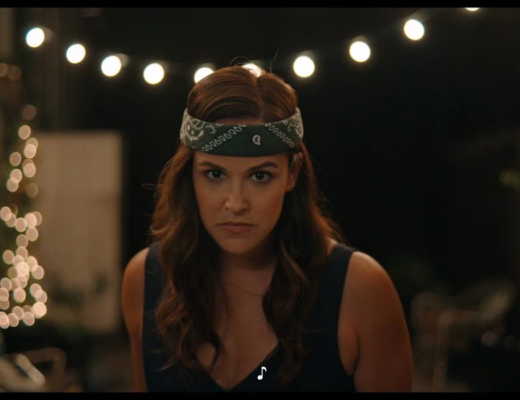Make Up brings a welcome horror twinge and unsettling tenor to an otherwise familiar kitchen sink drama.
There’s no shortage of coming-of-age stories out there, so credit director Claire Oakley for trying something a bit different with her debut feature Make Up. Set during the winter off-season at a caravan park in the seaside town of St. Ives, Cornwall, Oakley takes the familiar template of British kitchen-sink realism and injects it with a heavy dose of foreboding horror ambiance. Young Ruth (realized in an impressively reactive, opaque performance by Molly Windsor) arrives at camp in the dead of night, prepared to stay with her boyfriend Tom (Joseph Quinn) and hopefully find work. The place itself is virtually empty, with most of the pre-fab cottages literally wrapped up tight until Spring arrives, and Ruth finds herself aimlessly wandering the eerily calm beaches. When she finds a stray red hair amongst Tom’s things, Ruth is convinced that he’s been cheating on her and begins searching for a red-haired woman who may or may not exist. She soon meets other workers, including Jade (Stefanie Martini), an older, more self-assured woman who makes wigs in her spare time. Ruth assumes that Jade is the other woman, but her jealousy quickly morphs into something more complicated and abstract. As Ruth begins a kind of downward spiral, there are all sorts of strange, ominous, intrusions into this otherwise quotidian scenario, including dreamy interludes that may or may not be hallucinations and furtive glimpses of elusive phantoms.
Oakley displays an impressive control of the frame, alternating precise, symmetrical shots of buildings and spaces with the occasional extreme closeup or bursts of jittery hand-held camerawork. Cinematographer Nick Cooke shrouds daylight scenes with a soft fuzziness while turning nighttime compositions into velvety pools of undulating black, as distant light sources meld into the darkness. There’s more emphasis here on mood than story, which lends the proceedings a certain thinness, and some of the formal moves start to suffer from familiarity after a while. But as a good faith attempt at expressing a deeply subjective psychological experience through form and mood, particularly accentuating the destabilizing notion of one discovering something heretofore unknown hidden within, Make Up is a modest success.
Published as part of Before We Vanish | November 2020.







